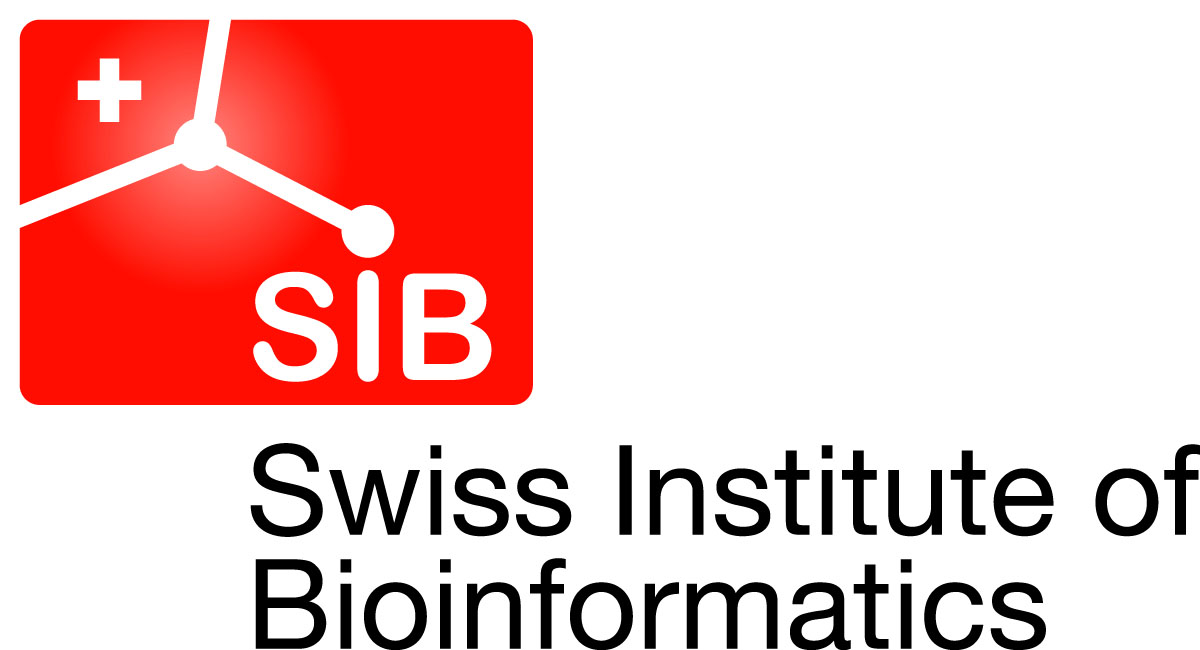-
UNIX Fundamentals

-
ViralZone
Phylogenetics of animal viral pathogens
 • beginnerAnimal pathogens E learning Phylogenetics
• beginnerAnimal pathogens E learning Phylogenetics -
BLAST and multiple sequence alignment (MSA) programs
 • beginnerBlast E learning Multiple sequence alignment
• beginnerBlast E learning Multiple sequence alignment -
Introduction to 3D-Structure Visualization and Homology Modeling using the Swiss-Model Workspace

-
Vital-IT Infrastructure Usage

-
R Basics Quiz
 • beginner
• beginner -
e-learning
UNIX Fundamentals
 • beginnerComputer science Problem based learning Programming Unix
• beginnerComputer science Problem based learning Programming Unix -
High Performance Computing in Life Sciences

-
Tutorial, Slideshow, e-learning
High Performance Computing (HPC) in Life Sciences
 • beginnerComputer science Bioinformatics Biology High performance computing high-performance computing
• beginnerComputer science Bioinformatics Biology High performance computing high-performance computing -
e-learning
Phylogenetics of animal pathogens: basic principles and applications
 • beginnerPhylogenetics Veterinary medicine Animal pathogens
• beginnerPhylogenetics Veterinary medicine Animal pathogens -
e-learning
BLAST and multiple sequence alignment (MSA) programs
 • beginnerSequence analysis Blast Multiple sequence alignment
• beginnerSequence analysis Blast Multiple sequence alignment -
Querying SIB resources with SPARQL

-
Computer Software, workflow
How to use V-pipe (SARS-CoV-2 data)
 • beginnerVirology Genetic variation Workflows Variant calling Alignment Read pre-processing coronavirus NGS bioinformatics Variant-calling
• beginnerVirology Genetic variation Workflows Variant calling Alignment Read pre-processing coronavirus NGS bioinformatics Variant-calling -
IFB Shiny training
•• intermediateR-programming Reproducible Science -
Training materials
Using bioinformatics to hunt SARS-CoV-2, its variants & its origins – a practical guide
 • beginnerBioinformatics for schools, basic bioinformatics, SARS-CoV-2 pandemic, genome analysis, protein sequence analysis, protein structure analysis, virus variants, spike protein, training material
• beginnerBioinformatics for schools, basic bioinformatics, SARS-CoV-2 pandemic, genome analysis, protein sequence analysis, protein structure analysis, virus variants, spike protein, training material -
Course design: Considerations for trainers – a Professional Guide
Curriculum development, course design, learning outcomes, Bloom's Taxonomy, assessment, course evaluation, training trainers, training material
-
BioMedIT: Information Security Awareness Training

-
e-learning
neXtProt : Exploring human proteins
 • beginnerProteins Proteomics Human biology
• beginnerProteins Proteomics Human biology -
Cybersecurity Quiz for SIB employees only (internal use)

-
Explore and visualize your data with Python

-
SARS-CoV-2 : Studying a new virus

-
Video, Training materials with mock data, e-learning
Querying Data with SPARQL
 • beginnerComputer science Data management FAIR data Medical informatics Data mining Query and retrieval Database search Data handling Data retrieval Clinical data …
• beginnerComputer science Data management FAIR data Medical informatics Data mining Query and retrieval Database search Data handling Data retrieval Clinical data … -
Cellosaurus : A resource on cell lines

-
Video, Training materials, Mock data, E-learning
How to use Python and R with RDF Data
 •• intermediateComputer science Data management FAIR data Medical informatics Query and retrieval Data handling Data retrieval Clinical data SPARQL Query data …
•• intermediateComputer science Data management FAIR data Medical informatics Query and retrieval Data handling Data retrieval Clinical data SPARQL Query data … -
Video, Training materials, E-learning
Validate Graph Data with SHACL
 •• intermediateMedical informatics FAIR data Data management Computer science Validation Data handling Clinical data SHACL Data validation RDF …
•• intermediateMedical informatics FAIR data Data management Computer science Validation Data handling Clinical data SHACL Data validation RDF … -
Video, Training materials, Mock data, E-learning
RDF Schema and Data Visualization
 • beginnerData visualisation Medical informatics FAIR data Data management Computer science Ontology visualisation Visualisation Data retrieval Data handling Query and retrieval …
• beginnerData visualisation Medical informatics FAIR data Data management Computer science Ontology visualisation Visualisation Data retrieval Data handling Query and retrieval … -
Video, Training materials, E-learning
Semantic Standards
 • beginnerComputer science Data management FAIR data Medical informatics Ontology and terminology Data handling Standardisation and normalisation Clinical data Data semantics FAIR …
• beginnerComputer science Data management FAIR data Medical informatics Ontology and terminology Data handling Standardisation and normalisation Clinical data Data semantics FAIR … -
Video, Training materials, E-learning
Training Primer (RDF and SPARQL)
 • beginnerComputer science Data management FAIR data Medical informatics Ontology and terminology Query and retrieval Database search Data handling Data retrieval Clinical data …
• beginnerComputer science Data management FAIR data Medical informatics Ontology and terminology Query and retrieval Database search Data handling Data retrieval Clinical data … -
Video, Training materials, E-learning
Expanding the SPHN RDF Schema
 • beginnerOntology and terminology Medical informatics FAIR data Data management Computer science Data editing Ontology visualisation Visualisation Data handling Clinical data …
• beginnerOntology and terminology Medical informatics FAIR data Data management Computer science Data editing Ontology visualisation Visualisation Data handling Clinical data … -
Getting Started With BioMedIT

-

SIB Swiss Institute of Bioinformatics
The SIB Swiss Institute of Bioinformatics is an academic, non-profit foundation recognised of public utility and established in 1998. SIB coordinates research and education in bioinformatics throughout Switzerland and provides high quality bioinformatics services to the national and international...
111 training materials64 events (612 past events)SIB Swiss Institute of Bioinformatics http://www.sib.swiss/training/training-group https://tess.elixir-europe.org/content_providers/swiss-institute-of-bioinformatics The SIB Swiss Institute of Bioinformatics is an academic, non-profit foundation recognised of public utility and established in 1998. SIB coordinates research and education in bioinformatics throughout Switzerland and provides high quality bioinformatics services to the national and international research community. /system/content_providers/images/000/000/011/original/sib_logo_medium.jpg?1662299701 -

Glittr.org
Glittr (https://glittr.org) is a web application that helps you find and compare bioinformatics training materials on GitHub and GitLab.
805 training materialsGlittr.org https://glittr.org https://tess.elixir-europe.org/content_providers/glittr-org Glittr (https://glittr.org) is a web application that helps you find and compare bioinformatics training materials on GitHub and GitLab. /system/content_providers/images/000/000/692/original/logo-with-domain.png?1698843802 -

BY-COVID
BeYond-COVID (BY-COVID) aims to provide comprehensive open data on SARS-CoV-2 and other infectious diseases across scientific, medical, public health and policy domains. It strongly emphasises mobilising raw viral sequences, helping to identify and monitor the spread of SARS-CoV-2 variants. The...
31 training materialsBY-COVID https://by-covid.org https://tess.elixir-europe.org/content_providers/by-covid BeYond-COVID (BY-COVID) aims to provide comprehensive open data on SARS-CoV-2 and other infectious diseases across scientific, medical, public health and policy domains. It strongly emphasises mobilising raw viral sequences, helping to identify and monitor the spread of SARS-CoV-2 variants. The project further accelerates access to SARS-CoV-2 and COVID-19 and linking patient and research data. To ensure interoperability of national and global efforts, BY-COVID enables federated data analysis compliant with data protection regulations, harmonise and manage metadata and sample identifiers, and facilitate long-term cataloguing. In an unprecedented and unique interdisciplinary effort, BY-COVID brings together 53 partners from 19 countries and stakeholders from the biomedical field, hospitals, public health, social sciences and humanities. Ultimately, it will improve European readiness for future pandemics, enhance genomic surveillance and rapid-response capabilities. In addition, BY-COVID serves as a demonstrator of interdisciplinary work across country borders. The project's outputs will allow scientists across multiple domains, including SMEs and industry, to access varied data with the potential to generate new knowledge on infectious diseases. /system/content_providers/images/000/000/810/original/BYCOVID_logo.png?1727690329 -

ERGA Knowledge Hub
The ERGA Knowledge Hub is an open, global home for Biodiversity Genomics teaching resources and courses curated by the European Reference Genome Atlas (ERGA) Community where you can share your lectures, tutorials, workshop materials, other learning tools, or upcoming courses, workshops, and...
128 training materials10 events (12 past events)ERGA Knowledge Hub https://knowledge.erga-biodiversity.eu/ https://tess.elixir-europe.org/content_providers/erga-knowledge-hub The ERGA Knowledge Hub is an open, global home for Biodiversity Genomics teaching resources and courses curated by the European Reference Genome Atlas (ERGA) Community where you can share your lectures, tutorials, workshop materials, other learning tools, or upcoming courses, workshops, and training events, in any language. /system/content_providers/images/000/000/827/original/ERGA-KH.png?1758638186
Activity log
 Switzerland
Switzerland

